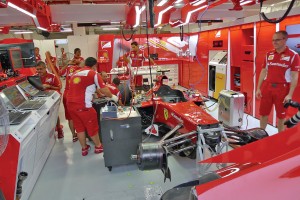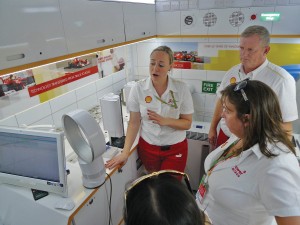
THE ENDURING Shell-Ferrari partnership has produced 160 F1 race wins, 3,500 F1 World Championship points, 12 F1 World Drivers’ Championship and 10 F1 World Constructors’ Championships.
Not so long ago Formula One cars were allowed to use specially blended fuels that contain significant amounts of highly explosive, poisonous, cancer-causing if not corrosive substances. This was permitted as such formulations enable F1 teams to have cars that could attain dramatic speed and better performance.
But with the growing concerns over energy conservation and care of the environment, authorities have reconsidered—restrictions on fuel blend were introduced.
Fédération Internationale de l’Automobile (FIA), the governing body for world motor sport including F1, believed such restrictions would encourage research into fuel economy and would align Formula One research with the challenges facing the wider automotive industry.
As a result, FIA required that F1 cars should run on gasoline, the specification of which should not that far removed from that used in regular road cars—meaning, no more manganese-based additives as well as excessive quantities of benzene, alcohol and aviation fuel.
“The intention is to ensure that F1 cars use fuel blends that are close to the composition of ordinary, commercially available gasoline and to prohibit the use of specific horsepower-inducing compounds,” said Ian Albiston, Shell’s Formula One project manager.
Technical collaboration

INSIDE the Shell Track Lab located at the Ferrari paddock, scientists run constant tests on the fuel and oil used by the two F1 cars during race day.
Shell’s technical collaboration with Scuderia Ferrari is one of the most established, dating back to 1950 when Shell continued its support to Enzo Ferrari—no longer a race driver but an owner of a team debuting at the 1950 Monaco Grand Prix.
That partnership still endures and has resulted in 160 F1 race wins, 3,500 F1 World Championship points, 12 F1 World Drivers’ Championship and 10 F1 World Constructors’ Championships.
“Shell provides Ferrari with a full analysis of fuel and oil samples at every race, using expert cutting-edge technology. In the Shell track lab—located within the Ferrari paddock—Shell scientists provide the racing team with a full analytical service at every race,” he said.
In this Shell Track Lab, Shell scientists run constant tests on the fuel and oil used in the two F1 cars to ensure that both Fernando Alonso and Felipe Massa will be able to get the most performance out of them.
Albiston added that while Ferrari’s success depends, among other factors, on having the most technologically advanced fuels and lubricants, Shell must also ensure that the fuel blends used by Ferrari in its F1 cars are 99 percent the same types of compounds found in the commercially available Shell V-Power Nitro+ products.
Last Sunday’s Grand Prix in Singapore marks the 500th time of this on-track collaboration. To highlight the amazing Shell-Ferrari partnership in Singapore, both Ferrari F2012s of Alonso and Massa carried a special “Shell 500 Races” logo on the rear wing.
Can afford one mistake
With the two-time world champion adding 15 more points (after finishing third in last Sunday’s GP), Alonso only needs to stay away from accidents and ensure podium finishes in the remaining six races of the 2012 season.
“I’m not under pressure at all. We have five or six contenders for the championship and seven (including Singapore GP) races to go. It will be tight until the last race but I’m probably the only one who can afford one mistake or one retire, the others cannot, so I think it is much more pressure,” said Alonso during a brief press presentation in Singapore.
The next stop on the schedule is Suzuka, for the Japanese Grand Prix on October 7.

